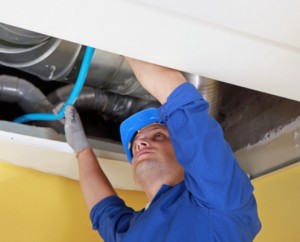 How Your Ducts Do Their Job
How Your Ducts Do Their Job
Your home's ductwork is a system of sheet metal, fiberglass and flexduct that carry air from the furnace, heat pump or air conditioner to each of your rooms. They' installed in walls, floors, basement, and/ or attic, depending on your home's design.
To ensure high indoor air quality and sufficient air supply, the ducts should be clean and free of obstructions. The system shouldn't leak more than 10 percent of the air it carries.
Keep Your Ducts Safe and Efficient
Points where the air ducts connect to the air handler, registers and vents, as well as to each other should fit securely and be sealed with mastic or foil-backed tape. Ducts in unconditioned spaces should be covered in duct wrap or batt insulation.
While a duct system can stay clean for years, regular professional inspections help catch problems before they do much damage. Every two years or three years, have your home's air ducts inspected for mold growth, pest infiltration, dust buildup and other debris. Duct inspections are also recommended after you move into a new home, after remodeling, and if you've noticed pest debris or patches of possible mold in or around your ducts.
Dirty ducts can release contaminants into your home's air. Debris buildup interferes with airflow and gums up the HVAC system's motor and other components, reducing energy efficiency and potentially leading to early component failure.
A heating and cooling professional can inspect sections of the ductwork you can't easily reach, spot any problems, and let you know if cleaning, repairs or upgrades are recommended.
For help keeping your heating and cooling system efficient or to have your air ducts inspected, contact Rodenhiser Plumbing, Heating & Air Conditioning. We proudly serve homeowners in the Route 495/128 area of Medway MA.
Image via Shutterstock.com